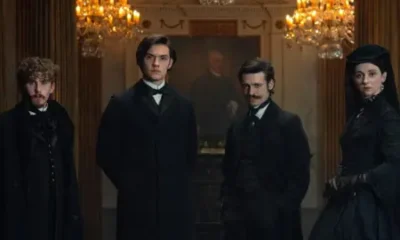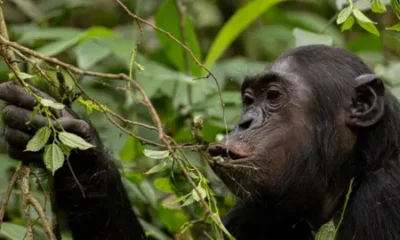Breaking News
Police used journalists’ phone data to detect leaks by staff, report says
Read more on post.
Julian O’NeillBBC News NI crime and justice correspondent
Concerns have been raised over how the Police Service of Northern Ireland (PSNI) used journalists’ phone numbers to check for any leaks of information by its officers or staff.
A 200-page report also revealed there were 21 unlawful uses of covert powers to attempt to uncover reporters’ sources – double the figure previously disclosed.
Its author, lawyer Angus McCullough KC, said he found that the PSNI’s surveillance of journalists and lawyers is not “widespread or systemic”.
PSNI Chief Constable Jon Boutcher said the report “rightfully highlights that we have to improve our processes, and we will”.
Mr Boutcher said that “blanket searching of journalists” stopped in 2023, and “[would] not happen again”.
In the report, Mr McCullough was critical of “particular instances” and “some areas of practice”.
The report covered PSNI surveillance practices between 2011 and 2024.
Last year, Mr McCullough was asked to carry out an independent review by Mr Boutcher.
It followed legal action by journalists Barry McCaffrey and Trevor Birney and allegations that other journalists, and lawyers, might have had their phones monitored.
The PSNI previously admitted 10 attempts to use the communications data of journalists to try to identify their sources.
But the report found 21 instances, all pre-2015, which are “considered unlawful” and which relate to eight journalists, including Mr McCaffrey.
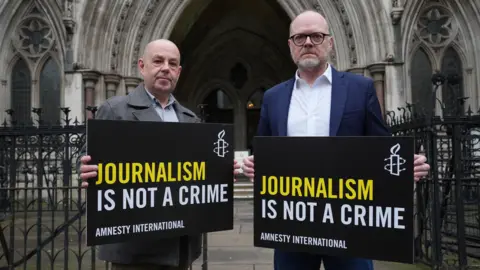 PA Media
PA MediaIn 2017, Mr Birney and Mr McCaffrey produced a documentary about the loyalist murders of six Catholic men as they watched a football match in a pub in Loughinisland in County Down in 1994.
No Stone Unturned was made by Belfast-based production company, Fine Point Films and directed by Oscar winner, Alex Gibney.
It examined how the Royal Ulster Constabulary (RUC) handled the case and made use of confidential documents from the Police Ombudsman for Northern Ireland (PONI) – a watchdog which investigates police conduct.
The PSNI treated the leak of PONI documents as theft.
A year later the two journalists were arrested.
They said their arrests were “an attack on the press” and challenged the way they were treated in court, winning substantial damages amounting to £875,000.
However, through legal disclosure material surfaced which revealed details of surveillance against them and other journalists.
Speaking on BBC Radio Ulster’s Talkback programme, Mr McCaffrey called for a public inquiry.
He said this would allow Northern Ireland Secretary Hilary Benn to “put the public confidence back in policing”.
Mr Birney welcomed the report but said his and Mr McCaffrey’s lawyers had not had a chance to “cross-examine the PSNI” and “review those documents… and test them against the law”.
Freedom of expression
Speaking at the report’s launch, Mr McCullough said there had been concerns of the effect the arrests could have on investigative journalism in Northern Ireland.
“Two journalists who had been investigating mass murder and allegations of state collusion had been arrested and subject to covert measures and surveillance of a suspected source”, the barrister said.
“The right of freedom of expression – including the freedom for journalists and civil society to examine the actions of the state – is fundamental to democracy.”
‘Lack of awareness’
The report also raised issues around the use of journalists’ phone numbers, which had been provided to the PSNI’s press office.
Between 2011 and 2023, the numbers were “washed through” police systems to detect any unauthorised contact between PSNI officers or staff and journalists.
This was referred to as pro-active “defensive operations” against leaks.
At one point, in 2011, it involved checking 65,000 calls against 383 journalists’ numbers.
The report states: “No legal advice appears to have been sought in relation to the legality or propriety of the practice.
“There seems to have been a lack of awareness until very recently that it might give rise to issues in relation to data protection and the rights of those whose data was being used unknowingly.
“This practice does not appear to have been necessary or proportionate.
“The scale and duration of defensive operations is a significant concern.”
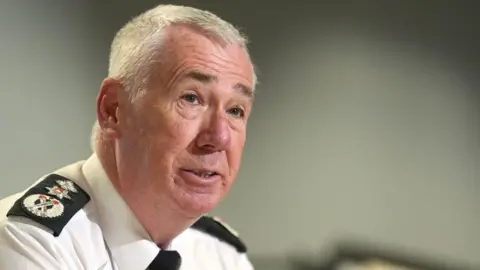 PA Media
PA MediaMr McCullough said the PSNI should consider self-reporting the matter to the UK’s data protection watchdog, the information commissioner.
He noted the practice was only formally discontinued in May of last year.
Investigative journalist Donal MacIntyre is named in the report as having been the subject of directed surveillance following posts he made on social media.
He is working on a documentary about the disappearance and death of schoolboy Noah Donohoe.
There was an unease that the X posts “created a serious risk of prejudice” to upcoming inquest proceedings.
Mr McCullough said he is concerned about the process that led to the surveillance being authorised, but added he found “no indication” that Mr MacIntyre’s private communications with Noah’s mother had been accessed.
Mr McIntyre said he was “shocked at the lackadaisical and lamentable processes that led the PSNI to authorise covert surveillance of [his] social media accounts”.
He said he was “relieved” that the review found his communications with Noah’s mother were not accessed.
However, he added that the findings exposed “profound institutional failings in the PSNI’s approach to covert surveillance” and raised “grave concerns” about the intrusion into his work and “the wider and potentially unchecked use of these powers in Northern Ireland”.
The report also found two instances of directed surveillance against an unnamed lawyer, including in a court building, without proper authorisation.
Mr McCullough did not examine any cases currently at the Investigatory Powers Tribunal, including MI5-conducted phone surveillance of journalist Vincent Kearney while he worked at the BBC.
Solicitor surveillance
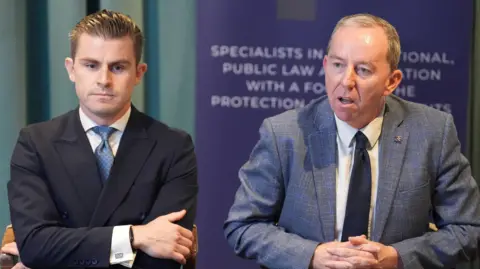 PA Media
PA MediaThe Chief Constable Jon Boutcher has issued a personal apology to two solicitors.
The apology, to Peter Corrigan and Darragh Mackin of Phoenix Law, came after a review found that the two were the subject of phone surveillance authorised on a “questionable” basis.
They said the surveillance trespassed upon legal professional privilege and linked it to appeal proceedings by two men jailed for the murder of police officer Stephen Carroll in Craigavon in 2009.
“A legal professional privilege is not some sort of technicality – it’s absolutely the foundation stone of a fair, criminal justice system in a liberal democracy and the PSNI have driven a coach and horses through that legal principle,” said Mr Corrigan.
“The police are entrusted to uphold the law and they have broken the law and acted unlawfully against us and our families. And obviously the fact that it has been identified in a report has to be commended and I would take this opportunity to also commend the chief constable for sending us both an apology for this arbitrary invasion of our privacy and our professional duties.”
‘Appropriate use of powers’
Mr Boutcher said that “properly exercised covert powers” had “an important role to play” in detecting, investigating, prosecuting and preventing crime.
“Mr McCullough makes reference to being struck by the utility of these powers in keeping the public better protected from a range of threats including organised crime, terrorism, paedophile rings and large scale drug supply,” he said.
Mr Boutcher said that “appropriate, lawful and proportionate use of these powers” keeps people safe and “builds confidence in policing”.
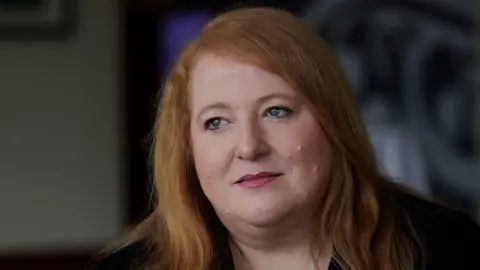 PA Media
PA MediaThe Justice Minister said the review “represents a significant commitment to transparency and accountability”.
Naomi Long said the NI Policing Board should be “afforded the time” to consider the review and added she stands “ready to support the Board in whatever action it feels is appropriate when it comes to implementing any recommendations” from the report.
It is expected that there will be a special meeting of the policing board to look at the report.
Breaking News
It’s got Peaky Blinders swagger, says House of Guinness writer
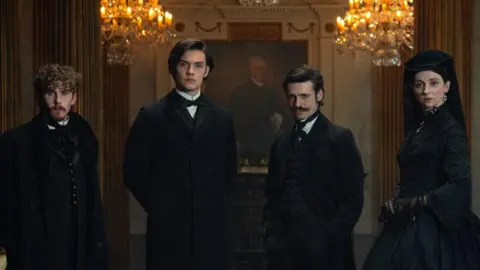
Read more on post.
Yasmin RufoBBC News
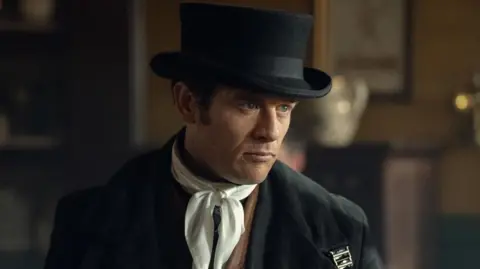 Netflix
NetflixTaking family power struggles and turning them into global television sensations is becoming something of a habit for screenwriter Steven Knight.
With Peaky Blinders, he took a Birmingham street gang and made them a cultural force. Now, Knight is betting on another dynasty, one rooted in brewing, wealth and legacy.
House of Guinness, which launches on Netflix on Thursday, tells the story of Ireland’s most famous family name at the moment of crisis – Sir Benjamin Guinness has died and his four children, each concealing dark secrets, are left to steer the brewery’s fate.
Knight says when he looked into the real-life Guinness family, “it was immediate that I realised this is an incredible drama and story”.
He was struck by “the characters, events and how it all intermeshed with history and what was going on at the time”.
While the story is based on real events, it is a drama first and foremost. Fact and fiction have been blended together, but Knight says he doesn’t see those two things as mutually exclusive, as “it’s often the true events that are the least believable”.
“Some of the historical events are so amazing and unexpected you wouldn’t make them up yourself,” he tells the BBC.
One of the imagined figures in the Netflix drama is Sean Rafferty, the brewery’s foreman, played by Happy Valley star James Norton, whose fate becomes entangled with the dynasty’s power struggles.
Norton says his character is an “amalgamation of lots of different people” who existed at the time, adding that he found researching into the history of Guinness “remarkable and fascinating”.
The 40-year-old explains that as soon as he read the script he was ready to sign up to the show.
“I read the first four scripts all at once and it was a no-brainer,” he says. “Almost every scene starts with Rafferty’s silhouette in a window in a cloud of smoke and I thought ‘sign me up, that’s really cool’.”
Most of the actors in the series were Irish, something Norton says added a level of pressure when it came to perfecting the accent and admits he was “so scared on the first day”.
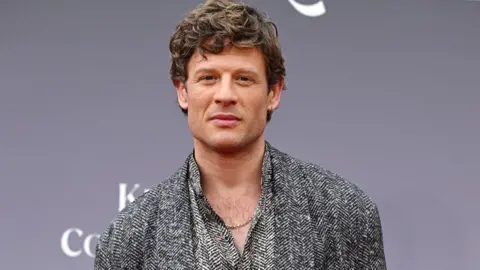 Getty Images
Getty Images“You work really hard at the beginning and once you crack the first big dialogue scene and have spoken the first lines there’s no going back,” he explains.
The first scene Norton filmed was one where he punches three disloyal workers at the Guinness factory. He says he used the line ‘I see your three names written in black ash up there’ to get back into the accent for subsequent scenes.
‘Once in a lifetime experience’
Starring alongside Norton is Irish actress Danielle Galligan who plays Lady Olivia, an aristocrat who marries into the Guinness family. After the British monarch, she was the richest woman in Britain and Ireland at the time.
The actress says she loved researching her character and understanding what she was really like.
“She’s such a firecracker in the series and then I actually found out she was also a very solitary and silent woman who painted lots of watercolours,” Galligan explains.
“She was a woman who had everything and yet was still looking for something. Learning about her gave me a sense of her lack of fulfilment and added another layer to her.”
Galligan says it was very special to tell an Irish story and “to do it on a global scale is a once-in-a-lifetime kind of experience”.
Joining Galligan is Niamh McCormack, whose character is part of the rebellious Fenian Brotherhood, and Jack Gleeson, who is best known for playing Joffrey Baratheon in Game of Thrones.
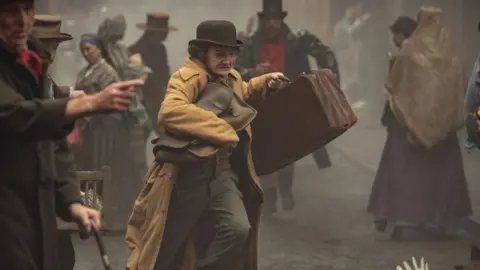 Netflix
NetflixMcCormack and Gleeson say they are proud to be part of a series that puts Ireland on the map, but admit that with pride comes pressure over how it will be received by audiences at home.
“It’s always a factor but I tried not to think about it too much,” Gleeson says. “You want things to be represented well but also hopefully people know not to take it too seriously as a historical document.”
Knight was less worried about what audiences would think, admitting: “I should care but I don’t – if you worry what people are going to think you can’t really do anything as you’d be trying to please too many different people.”
House of Guinness has already been compared to the likes of Succession, The Crown and Peaky Blinders but Knight is indifferent about how people compare it.
“People say every project is a cross between stuff and I don’t take that too seriously, I’m confident that this is its own thing,” he says.
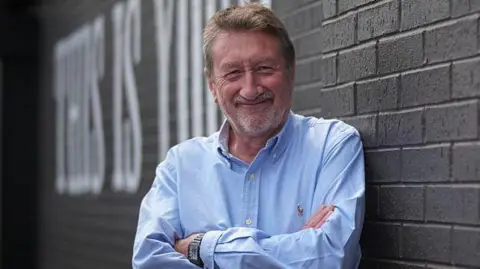 Getty Images
Getty ImagesFor Norton, who is also currently starring in BBC’s historical drama King & Conqueror, to be compared to such successful shows is a positive.
“To be in the same breath as those dynasty shows is great and I’m happy if we’re included among that group,” he says. Gleeson agrees and explains that this drama “takes the best bits of the rest and adds its own magic and essence”.
Knight does admit that there are many similarities between House of Guinness and Peaky Blinders and the shows have influenced each other as the 66-year-old has recently finished working on the Peaky Blinder film, The Immortal Man, which will see Cillian Murphy reprise his role as Birmingham gangster Tommy Shelby.
“Sometimes parallels are pointed out that I don’t even have a clue about,” he laughs. “But there are a lot of similarities – the family, it has the same energy, humour and swagger.”
 BBC Studios
BBC StudiosKnight is also involved in writing the new James Bond film, which he previously told the BBC had always been on his bucket list.
The movie will be directed by Dune’s Denis Villeneuve and is currently in development and being overseen by Amazon MGM Studios after long-serving masterminds Barbara Broccoli and Michael G Wilson stood down in February.
When asked a question about Bond, Knight smiles and says he’s not able to talk about it but does admit that after the success of several of his shows, he feels a greater freedom to write more creatively.
And with House of Guinness, he hopes to have used that freedom to make this latest dynasty saga a success in its own right.
Breaking News
UK boosts pandemic readiness with new vaccine factory
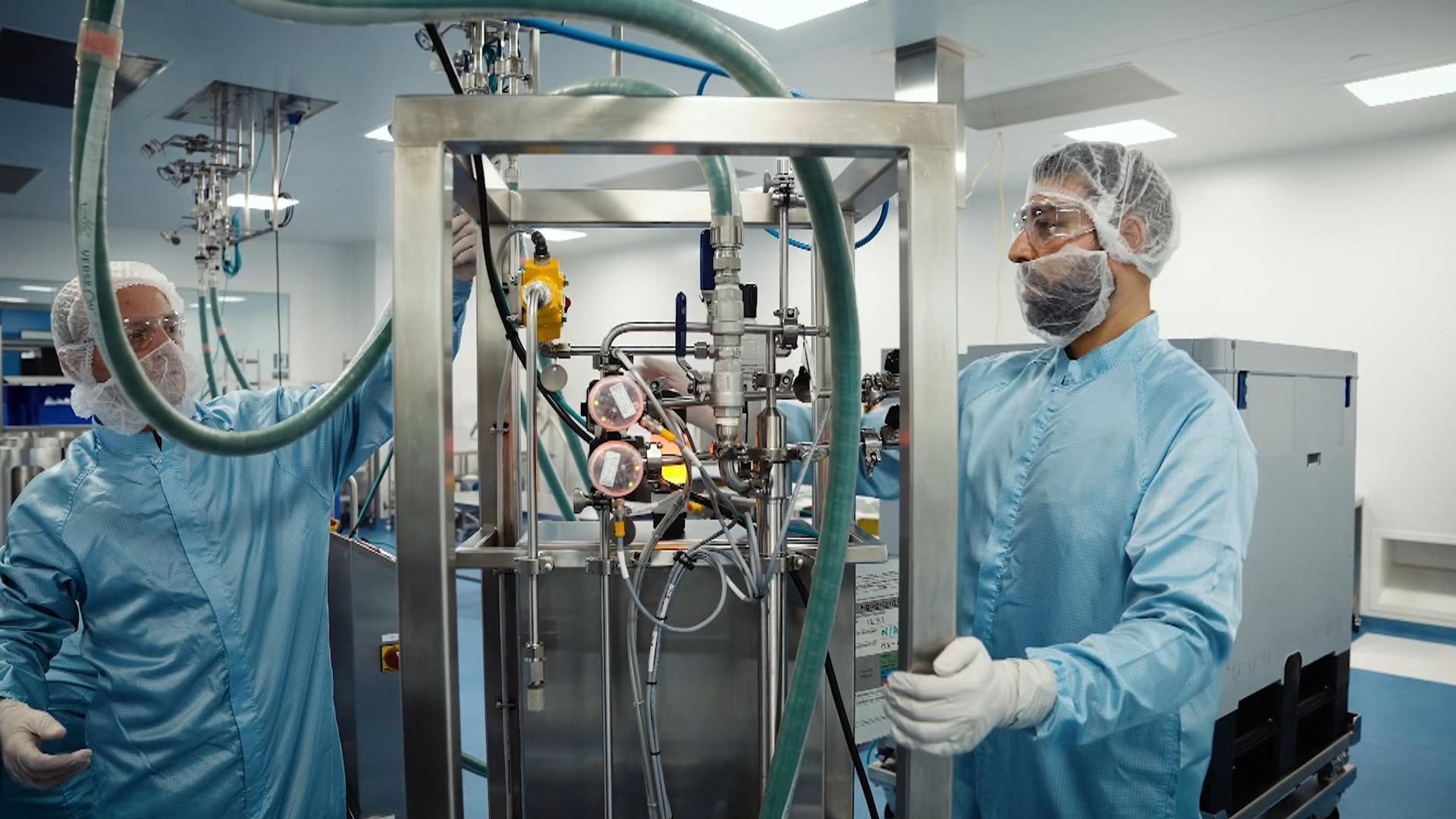
Read more on post .
A US vaccine firm has opened the first mRNA manufacturing plant in the UK, against a backdrop of increasing anti-jab rhetoric back home.
The new facility outside Oxford is part of a £1bn investment in the UK by Moderna, which specialises in mRNA.
The novel vaccine technology delivered some of the most effective and fastest-to-develop jabs during the COVID pandemic.
Several pharma companies, including Germany’s leading mRNA pioneer BioNTech, are now racing to develop new therapies.
Moderna says the plant will produce up to 100 million doses of its existing vaccine products each year. It has also been designed to scale-up production to 250 million doses a year in the event of a new disease outbreak.
“God-forbid, if there is another pandemic, we can switch the facility any day,” said Moderna CEO Stephane Bancel.
The UK investment deal was agreed by the previous government, but the plant’s opening is welcome relief for the current one.
In recent weeks, four major pharmaceutical companies have halted planned investments in the UK following disputes over drug pricing and profitability in the UK.
‘A great statement’
It also promises to restore domestic vaccine manufacturing capability in the UK, the lack of which was exposed when dangerous supply interruptions threatened the early COVID response.
“It’s a really fast way of getting new vaccines discovered,” said Lord Patrick Vallance, former chief scientist and now science minister.
“It’s also a great statement of confidence in the UK that [Moderna has] chosen to base themselves here.”
The Trump effect
The mRNA molecule is the same used by our cells to order the production of new proteins, and allows vaccines to be produced using just the genetic code of a virus or other biological target.
Moderna’s investment decision pre-dated Donald Trump’s return to the White House, but the Moderna CEO said its operation in the UK – a country that “still believes in vaccination” – may pay dividends if anti-vaccine rhetoric translates into a lack of demand for its products in the US.
“If there is less appetite by governments around the world, including in the US, to use vaccines, we might invest less in vaccines,” said Mr Bancel.
“We have to invest where there’s a demand for our products.”
Read more: All health claims made by Trump – and what experts say
The UK presents other attractions for the company which has suffered substantial losses as demand for its COVID vaccine has fallen.
It’s betting that leading UK universities and a large patient population will make for successful clinical trials.
The company has ongoing NHS trials of new jabs against seasonal flu, a combination COVID and flu vaccine, cancer vaccines and mRNA therapies for two inherited childhood diseases.
Moderna says it is now the largest private commercial sponsor of clinical trials in the UK.
Breaking News
‘Pathetic’ fines won’t stop water pollution, say campaigners
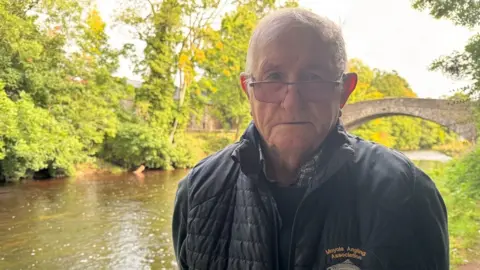
Read more on post.
Luke SprouleBBC News NI Mid Ulster reporter
Campaigners have said stronger deterrents are needed to stop water pollution after figures obtained by BBC News NI showed there were 63 fines handed down between 2020 and 2024.
In the same period there were 4,202 water pollution incidents confirmed by the Northern Ireland Environment Agency (NIEA).
The Department for Agriculture, Environment and Rural Affairs (Daera) is consulting on whether fixed penalty notices should be introduced, which would mean polluters could be fined without the lengthy process of prosecuting them through the courts.
Friends of the Earth said unless there was a more effective deterrent there would be “more and more of these shocking crimes against water”.
In recent years large blooms of potentially toxic blue-green algae in Lough Neagh – caused in large part by long-term pollution – have grabbed the headlines.
But incidents of pollution happen right across Northern Ireland’s waterways, not just those which eventually lead to the lough.
Daera said it and the NIEA took the issue very seriously and that the NIEA investigated all reports it received and pursued offenders.
Call to scrap limit on fines
James Orr from Friends of the Earth said the figures revealed “an epidemic in relation to how we’re treating our rivers, lakes and sea loughs”.
He said fixed penalty notices – which are already used for things such as dog fouling or illegal parking – had pros and cons.
“We can’t have these cases dragged through the courts for years and years and then a pathetic fine introduced at the end.
“On the one hand we would be quite encouraged that we could simplify these processes.
“On the other hand, we need the penalty to reflect the seriousness of the crime.
“This is not like parking on a double yellow line, this is much more serious.”
Under the current rules, the maximum fine that can be handed down is £20,000.
Mr Orr called for this limit to be scrapped and said there should be an independent Environmental Protection Agency.
The Daera consultation on whether to introduce fixed penalty notices is also asking people whether or not the maximum fines should be increased to £50,000 in magistrates’ courts and whether the limit should be removed entirely in Crown courts.
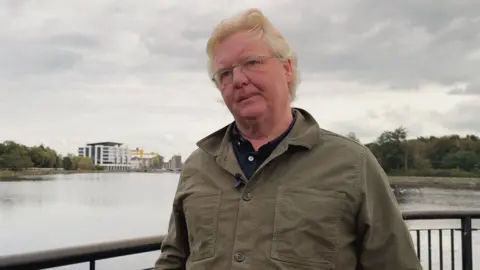
All 63 fines ranged from £200 to £10,000.
Of these, six were more than £5,000.
In a statement, Daera said formal enforcement action was normally considered for water pollution incidents which it deemed to have a “high” or “medium” severity.
Lower severity incidents normally did not lead to formal enforcement action and would see NIEA work with the polluter to identify the cause and stop it happening again.
From 2020 to 2024, 96 incidents were deemed to be high severity and 542 medium, with the rest categorised as low.
People who use the waterways have said they are frustrated that incidents of pollution keep happening.
In June, anglers on the Moyola River raised the alarm after the river was turned brown due to what they believe was discharge from industry.
Maurice Dorrity, who has been fishing on the river for decades, said the situation was getting worse.
“I had a meeting on the bank of the river 30 years ago [to discuss] the same problem and it’s not got any better, it’s still the same,” he said.
“It has a devastating effect on the fish life.
“On the bed of the river the fish depends on the invertebrates, small insects to sustain their life, just like we need the ground to grow our crops.
“It clogs up all that invertebrate life on the bed of the river and it means the fish are not getting the food they require.”
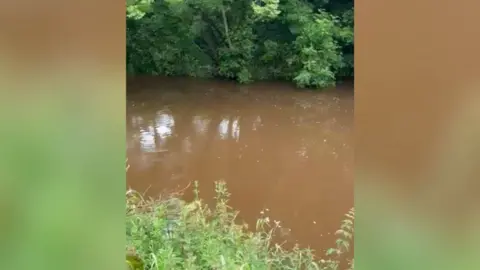
Social Democratic and Labour Party (SDLP) councillor Denies Johnston reported the incident to the NIEA.
She said many of the problems were stemming from some “irresponsible” farmers and industries.
“There must be a two-prong response, we must incentivise good practice and punish infringements,” she said.
“Until we clamp down on those who are disregarding the advice, ignoring regulations and putting their own selfish interests ahead of our environment, our waters will continue to run orange (as was the case in the Moyola in July) and green (as in Lough Neagh).”
A Daera spokesperson said in addition to fines, other methods including warning letters and notices were available to it.
They added that strengthening environmental governance was a top priority for Daera Minister Andrew Muir.
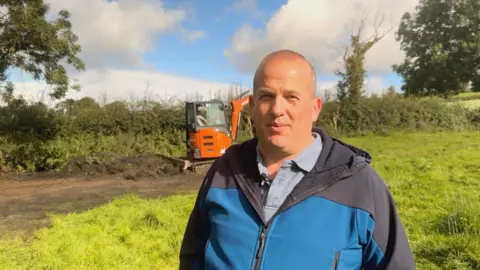
Incidents do not have to be large in scale to cause damage.
Earlier in September, an incident south of Dungannon led to sewage spewing into the River Rhone.
The NIEA said it was caused by wipes and rags being disposed of incorrectly.
Democratic Unionist Party councillor Clement Cuthbertson said it was a reminder that it was not just agriculture to blame for pollution.
“The landowner had livestock in the field and they had to be moved back to allow a clean up to take place,” he said.
“There needs to be investment on the network.
“Our towns and our villages are expanding all the time, but to be fair to NI Water they are still working on the original pipeworks that could be 40 or 50 years old.”
-
Culture2 days ago
Taylor Swift’s new cinema outing generates more than €12million in just 24 hours
-
Politics2 days ago
European Parliament snubs Orbán with vote to shield Italian MEP from Hungarian arrest
-
Culture1 day ago
Milan Fashion Week 2025: Unmissable shows and Giorgio Armani in mind
-
Culture2 days ago
Marvel stars Mark Ruffalo and Pedro Pascal stand up for Jimmy Kimmel as Disney boycott intensifies
-
Opinion2 days ago
AI Is Pointless If It Doesn’t Boost Productivity
-
Environment1 week ago
Chimps drinking a lager a day in ripe fruit, study finds
-
Business14 hours ago
Households to be offered energy bill changes, but unlikely to lead to savings
-
Culture2 days ago
From Koniaków to Paris: how traditional Polish crocheting is captivating high fashion





